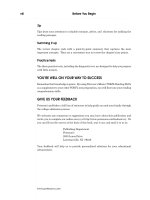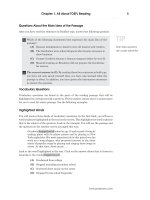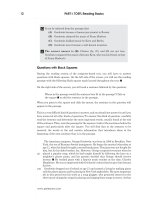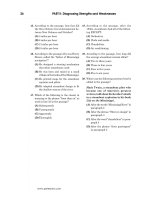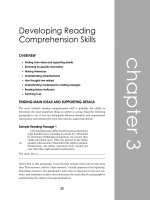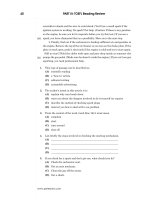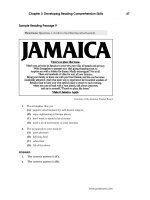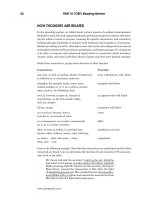Peterson’s master toefl reading skills part 26 docx
Bạn đang xem bản rút gọn của tài liệu. Xem và tải ngay bản đầy đủ của tài liệu tại đây (71.08 KB, 7 trang )
166 PART V: Appendixes
www.petersons.com
predominant (adjective) greatest in numbers or influence. Although hundreds of
religions are practiced in India, the predominant faith is Hinduism. predominance
(noun), predominate (verb).
prepossessing (adjective) attractive. Smart, lovely, and talented, she has all the
prepossessing qualities that mark a potential movie star.
presumptuous (adjective) going beyond the limits of courtesy or appropriateness. The
senator winced when the presumptuous young staffer addressed him as “Chuck.”
presume (verb), presumption (noun).
pretentious (adjective) claiming excessive value or importance. For an ordinary shoe
salesman to call himself a “Personal Foot Apparel Consultant” seems awfully preten-
tious. pretension (noun).
procrastinate (verb) to put off, to delay. If you habitually procrastinate, try this
technique: never touch a piece of paper without either filing it, responding to it, or
throwing it out. procrastination (noun).
profane (adjective) impure, unholy. It seems inappropriate to have such profane
activities as roller blading and disco dancing in a church. profane (verb), profanity
(noun).
proficient (adjective) skillful, adept. A proficient artist, Louise quickly and accurately
sketched the scene. proficiency (noun).
proliferate (verb) to increase or multiply. Over the past fifteen years, high-tech
companies have proliferated in northern California, Massachusetts, and other regions.
proliferation (noun).
prolific (adjective) producing many offspring or creations. With over three hundred
books to his credit, Isaac Asimov was one of the most prolific writers of all time.
prominence (noun) the quality of standing out; fame. Kennedy’s victory in the West
Virginia primary gave him a position of prominence among the Democratic candidates
for president. prominent (adjective).
promulgate (verb) to make public, to declare. Lincoln signed the proclamation that
freed the slaves in 1862, but he waited several months to promulgate it.
propagate (verb) to cause to grow; to foster. John Smithson’s will left his fortune for the
founding of an institution to propagate knowledge, without saying whether that meant
a university, a library, or a museum. propagation (noun).
07_TOEFLReadingAppA,135-176 7/29/06, 12:22166
Appendix A: A Helpful Word List 167
www.petersons.com
propriety (noun) appropriateness. Some people had doubts about the propriety of
former president Clinton’s discussing his underwear on MTV.
prosaic (adjective) everyday, ordinary, dull. “Paul’s Case” tells the story of a boy who
longs to escape from the prosaic life of a clerk into a world of wealth, glamour, and beauty.
protagonist (noun) the main character in a story or play; the main supporter of an idea.
Leopold Bloom is the protagonist of James Joyce’s great novel Ulysses.
provocative (adjective) likely to stimulate emotions, ideas, or controversy. The
demonstrators began chanting obscenities, a provocative act that they hoped would cause
the police to lose control. provoke (verb), provocation (noun).
proximity (noun) closeness, nearness. Neighborhood residents were angry over the
proximity of the sewage plant to the local school. proximate (adjective).
prudent (adjective) wise, cautious, and practical. A prudent investor will avoid putting
all of her money into any single investment. prudence (noun), prudential (adjective).
pugnacious (adjective) combative, bellicose, truculent; ready to fight. Ty Cobb, the
pugnacious outfielder for the Detroit Tigers, got into more than his fair share of brawls,
both on and off the field. pugnacity (noun).
punctilious (adjective) very concerned about proper forms of behavior and manners.
A punctilious dresser like James would rather skip the party altogether than wear the
wrong color tie. punctilio (noun).
pundit (noun) someone who offers opinions in an authoritative style. The Sunday
afternoon talk shows are filled with pundits, each with his or her own theory about this
week’s political news.
punitive (adjective) inflicting punishment. The jury awarded the plaintiff one million
dollars in punitive damages, hoping to teach the defendant a lesson.
purify (verb) to make pure, clean, or perfect. The new plant is supposed to purify the
drinking water provided to everyone in the nearby towns. purification (noun).
quell (verb) to quiet, to suppress. It took a huge number of police to quell the rioting.
querulous (adjective) complaining, whining. The nursing home attendant needed a lot
of patience to care for the three querulous, unpleasant residents on his floor.
rancorous (adjective) expressing bitter hostility. Many Americans are disgusted by
recent political campaigns, which seem more rancorous than ever before. rancor (noun).
07_TOEFLReadingAppA,135-176 7/29/06, 12:22167
168 PART V: Appendixes
www.petersons.com
rationale (noun) an underlying reason or explanation. At first, it seemed strange that
several camera companies would freely share their newest technology; but their rationale
was that offering one new style of film would benefit them all.
raze (verb) to completely destroy; demolish. The old Coliseum building will soon be
razed to make room for a new hotel.
reciprocate (verb) to make a return for something. If you’ll baby-sit for my kids tonight,
I’ll reciprocate by taking care of yours tomorrow. reciprocity (noun).
reclusive (adjective) withdrawn from society. During the last years of her life, actress
Greta Garbo led a reclusive existence, rarely appearing in public. recluse (noun).
reconcile (verb) to make consistent or harmonious. Roosevelt’s greatness as a leader
can be seen in his ability to reconcile the demands and values of the varied groups that
supported him. reconciliation (noun).
recriminate (verb) to accuse, often in response to an accusation. Divorce proceedings
sometimes become bitter, as the two parties recriminate each other over the causes of the
breakup. recrimination (noun), recriminatory (adjective).
recuperate (verb) to regain health after an illness. Although she left the hospital two
days after her operation, it took her a few weeks to fully recuperate. recuperation
(noun), recuperative (adjective).
redoubtable (adjective) inspiring respect, awe, or fear. Johnson’s knowledge, experi-
ence, and personal clout made him a redoubtable political opponent.
refurbish (verb) to fix up; renovate. It took three days’ work by a team of carpenters,
painters, and decorators to completely refurbish the apartment.
refute (adjective) to prove false. The company invited reporters to visit their plant in an
effort to refute the charges of unsafe working conditions. refutation (noun).
relevance (noun) connection to the matter at hand; pertinence. Testimony in a criminal
trial may be admitted only if it has clear relevance to the question of guilt or innocence.
relevant (adjective).
remedial (adjective) serving to remedy, cure, or correct some condition. Affirmative
action can be justified as a remedial step to help minority members overcome the effects
of past discrimination. remediation (noun), remedy (verb).
remorse (noun) a painful sense of guilt over wrongdoing. In Poe’s story “The Tell-Tale
Heart,” a murderer is driven insane by remorse over his crime. remorseful (adjective).
07_TOEFLReadingAppA,135-176 7/29/06, 12:22168
Appendix A: A Helpful Word List 169
www.petersons.com
remuneration (noun) pay. In a civil lawsuit, the attorney often receives part of the
financial settlement as his or her remuneration. remunerate (verb), remunerative
(adjective).
renovate (verb) to renew by repairing or rebuilding. The television program “The New
This Old House” shows how skilled craftspeople renovate houses. renovation (noun).
renunciation (noun) the act of rejecting or refusing something. King Edward VII’s
renunciation of the British throne was caused by his desire to marry an American
divorcee, something he couldn’t do as king. renounce (verb).
replete (adjective) filled abundantly. Graham’s book is replete with wonderful stories
about the famous people she has known.
reprehensible (adjective) deserving criticism or censure. Although the athlete’s
misdeeds were reprehensible, not all fans agree that he deserves to be excluded from the
Baseball Hall of Fame. reprehend (verb), reprehension (noun).
repudiate (verb) to reject, to renounce. After it became known that the congressman had
been a leader of the Ku Klux Klan, most politicians repudiated him. repudiation
(noun).
reputable (adjective) having a good reputation; respected. Find a reputable auto
mechanic by asking your friends for recommendations based on their own experiences.
reputation (noun), repute (noun).
resilient (adjective) able to recover from difficulty. A pro athlete must be resilient, able
to lose a game one day and come back the next with confidence and enthusiasm.
resilience (adjective).
resplendent (adjective) glowing, shining. In late December, midtown New York is
resplendent with holiday lights and decorations. resplendence (noun).
responsive (adjective) reacting quickly and appropriately. The new director of the
Internal Revenue Service has promised to make the agency more responsive to public
complaints. respond (verb), response (noun).
restitution (noun) return of something to its original owner; repayment. Some Native
American leaders are demanding that the U.S. government make restitution for the
lands taken from them by white settlers.
revere (verb) to admire deeply, to honor. Millions of people around the world revered
Mother Teresa for her saintly generosity. reverence (noun), reverent (adjective).
07_TOEFLReadingAppA,135-176 7/29/06, 12:22169
170 PART V: Appendixes
www.petersons.com
rhapsodize (verb) to praise in a wildly emotional way. That critic is such a huge fan
of Toni Morrison that she will surely rhapsodize over the writer’s next novel.
rhapsodic (adjective).
sagacious (adjective) discerning, wise. Only a leader as sagacious as Nelson Mandela
could have united South Africa so successfully and peacefully. sagacity (noun).
salvage (verb) to save from wreck or ruin. After the earthquake destroyed her home, she
was able to salvage only a few of her belongings. salvage (noun), salvageable
(adjective).
sanctimonious (adjective) showing false or excessive piety. The sanctimonious prayers
of the TV preacher were interspersed with requests that the viewers send him money.
sanctimony (noun).
scapegoat (noun) someone who bears the blame for others’ acts; someone hated for no
apparent reason. Although the shortstop’s error was only one reason the Red Sox lost,
many fans made him the scapegoat, booing him mercilessly.
scrupulous (adjective) acting with extreme care; painstaking. Disney theme parks are
famous for their scrupulous attention to small details. scruple (noun).
scrutinize (verb) to study closely. The lawyer scrutinized the contract, searching for any
sentence that could pose a risk for her client. scrutiny (noun).
secrete (verb) to emit; to hide. Glands in the mouth secrete saliva, a liquid that helps
in digestion. The jewel thieves secreted the necklace in a tin box buried underground.
sedentary (adjective) requiring much sitting. When Officer Samson was given a desk
job, she had trouble getting used to sedentary work after years on the street.
sequential (adjective) arranged in an order or series. The courses for the chemistry
major are sequential; you must take them in the order, since each course builds on the
previous ones. sequence (noun).
serendipity (noun) the ability to make lucky accidental discoveries. Great inventions
sometimes come about through deliberate research and hard work, sometimes through
pure serendipity. serendipitous (adjective).
servile (adjective) like a slave or servant; submissive. The tycoon demanded that his
underlings behave in a servile manner, agreeing quickly with everything he said.
servility (noun).
07_TOEFLReadingAppA,135-176 7/29/06, 12:22170
Appendix A: A Helpful Word List 171
www.petersons.com
simulated (adjective) imitating something else; artificial. High-quality simulated
gems must be examined under a magnifying glass to be distinguished from real ones.
simulate (verb), simulation (noun).
solace (verb) to comfort or console. There was little the rabbi could say to solace the
husband after his wife’s death. solace (noun).
spontaneous (adjective) happening without plan or outside cause. When the news of
Kennedy’s assassination broke, people everywhere gathered in a spontaneous effort to
share their shock and grief. spontaneity (noun).
spurious (adjective) false, fake. The so-called Piltdown Man, supposed to be the fossil
of a primitive human, turned out to be spurious, although who created the hoax is still
uncertain.
squander (verb) to use up carelessly, to waste. Those who had made donations to the
charity were outraged to learn that its director had squandered millions on fancy dinners
and first-class travel.
staid (adjective) sedate, serious, and grave. This college is no “party school”; the
students all work hard, and the campus has a reputation for being staid.
stagnate (verb) to become stale through lack of movement or change. Having had no
contact with the outside world for generations, Japan’s culture gradually stagnated.
stagnant (adjective), stagnation (noun).
stimulus (noun) something that excites a response or provokes an action. The arrival
of merchants and missionaries from the West provided a stimulus for change in Japanese
society. stimulate (verb).
stoic (adjective) showing little feeling, even in response to pain or sorrow. A soldier must
respond to the death of his comrades in stoic fashion, since the fighting will not stop for
his grief. stoicism (noun).
strenuous (adjective) requiring energy and strength. Hiking in the foothills of the
Rockies is fairly easy, but climbing the higher peaks can be strenuous.
submissive (adjective) accepting the will of others; humble, compliant. At the end of
Ibsen’s play A Doll’s House, Nora leaves her husband and abandons the role of
submissive housewife.
substantiated (adjective) verified or supported by evidence. The charge that Nixon had
helped to cover up crimes was substantiated by his comments about it on a series of audio
tapes. substantiate (verb), substantiation (noun).
07_TOEFLReadingAppA,135-176 7/29/06, 12:22171
172 PART V: Appendixes
www.petersons.com
sully (verb) to soil, stain, or defile. Nixon’s misdeeds as president did much to sully the
reputation of the American government.
superficial (adjective) on the surface only; without depth or substance. Her wound was
superficial and required only a light bandage. His superficial attractiveness hides the
fact that his personality is lifeless and his mind is dull. superficiality (noun).
superfluous (adjective) more than is needed, excessive. Once you’ve won the debate,
don’t keep talking; superfluous arguments will only bore and annoy the audience.
suppress (verb) to put down or restrain. As soon as the unrest began, thousands of
helmeted police were sent into the streets to suppress the riots. suppression (noun).
surfeit (noun) an excess. Most American families have a surfeit of food and drink on
Thanksgiving Day. surfeit (verb).
surreptitious (adjective) done in secret. Many FBI agents believe the apartment houses
a surreptitious drug-dealing business.
surrogate (noun) a substitute. When the congressman died in office, his wife was named
to serve the rest of his term as a surrogate. surrogate (adjective).
sustain (verb) to keep up, to continue; to support. Because of fatigue, he was unable to
sustain the effort needed to finish the marathon.
tactile (adjective) relating to the sense of touch. The thick brush strokes and gobs of color
give the paintings of Van Gogh a strongly tactile quality. tactility (noun).
talisman (noun) an object supposed to have magical effects or qualities. Superstitious
people sometimes carry a rabbit’s foot, a lucky coin, or some other talisman.
tangential (adjective) touching lightly; only slightly connected or related. Having
enrolled in a class on African-American history, the students found the teacher’s stories
about his travels in South America only of tangential interest. tangent (noun).
tedium (noun) boredom. For most people, watching the Weather Channel for 24 hours
would be sheer tedium. tedious (adjective).
temerity (noun) boldness, rashness, excessive daring. Only someone who didn’t
understand the danger would have the temerity to try to climb Everest without a guide.
temerarious (adjective).
temperance (noun) moderation or restraint in feelings and behavior. Most professional
athletes practice temperance in their personal habits; too much eating or drinking, they
know, can harm their performance. temperate (adjective).
07_TOEFLReadingAppA,135-176 7/29/06, 12:22172

